Key takeaways:
- Pregnancy fatigue is often caused by hormonal changes, particularly in the first and third trimesters, making it crucial to listen to one’s body and prioritize rest.
- Recognizing symptoms of true fatigue, such as constant drowsiness and difficulty concentrating, can help in seeking help and emphasizing self-care.
- Engaging in light exercise, maintaining good nutrition, and seeking support from friends and family are effective strategies for managing fatigue during pregnancy.
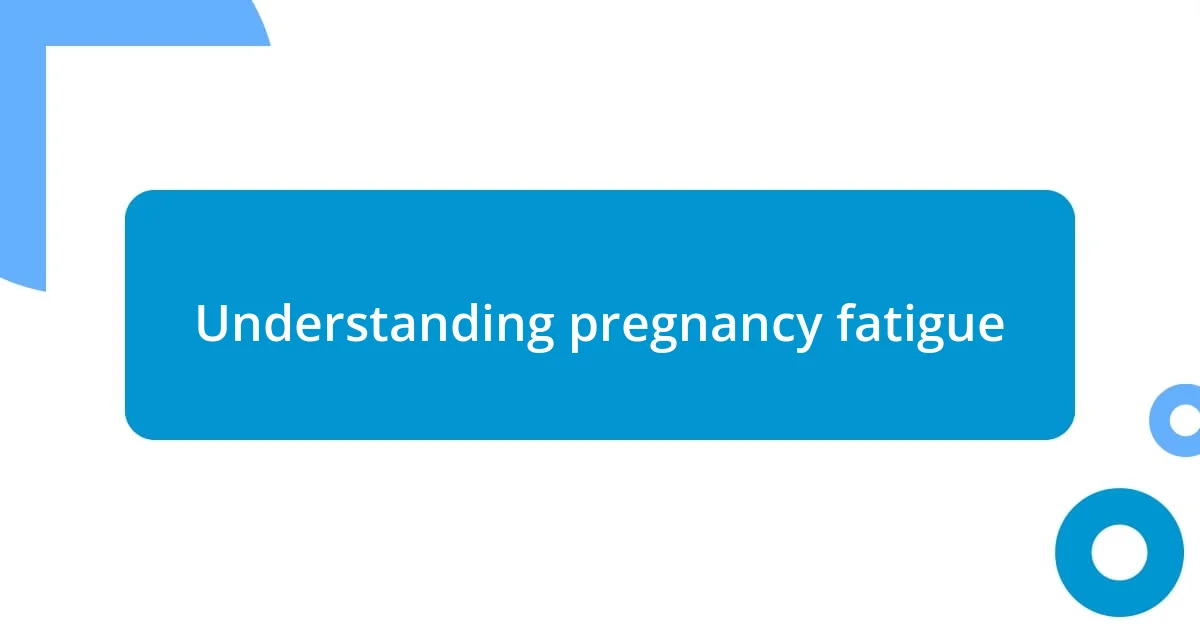
Understanding pregnancy fatigue
Pregnancy fatigue is more than just feeling sleepy; it often creeps in like a fog, wrapping around your energy levels and making everyday tasks daunting. I remember days when just getting out of bed felt like scaling a mountain. Isn’t it wild how something as beautiful as pregnancy can also leave you exhausted?
Hormonal changes are a significant contributor to this fatigue, particularly during the first and third trimesters. I found myself questioning if it was normal to feel this depleted. Sometimes, I felt as if my body was a stranger—demanding rest while my mind craved productivity. It’s easy to forget that the body is working incredibly hard to support new life, and recognizing this can be a relief.
Listening to my body became crucial as I navigated this fatigue. I learned that guilt over resting was pointless; embracing those moments of stillness helped recharge my emotional and physical batteries. Have you ever felt the weight of responsibility competing against your need for self-care? It’s a tricky balance, but understanding that fatigue is a common part of the pregnancy journey can pave the way for a gentler approach to self-expectations.
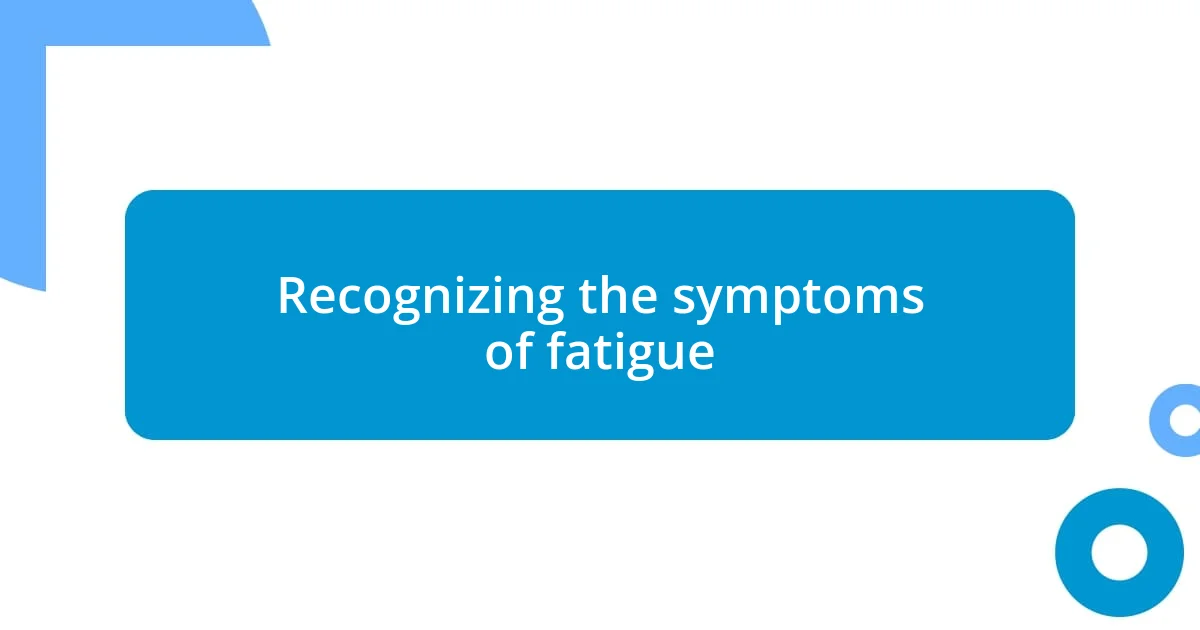
Recognizing the symptoms of fatigue
Recognizing the symptoms of pregnancy fatigue can be a nuanced experience. I remember grappling with the difference between typical tiredness and fatigue that felt all-encompassing. While it’s natural to feel tired during pregnancy, true fatigue is characterized by a persistent sense of exhaustion that doesn’t fade away with a good night’s sleep. Listening to my body helped me distinguish between the two.
Here are some key symptoms to watch for:
- Constant drowsiness, feeling heavy-limbed, or struggling to stay awake
- A noticeable decrease in motivation or the desire to engage in activities you usually enjoy
- Difficulty concentrating or experiencing “pregnancy brain”
- Frequent headaches or feelings of irritability without a clear cause
- Sudden changes in appetite or disrupted sleep patterns
Understanding these symptoms made it easier for me to reach out for help and ultimately prioritize self-care when I needed it the most. Recognizing when fatigue was impacting my daily life helped eliminate some of that confusion—and trust me, it was a relief to finally give myself permission to rest.
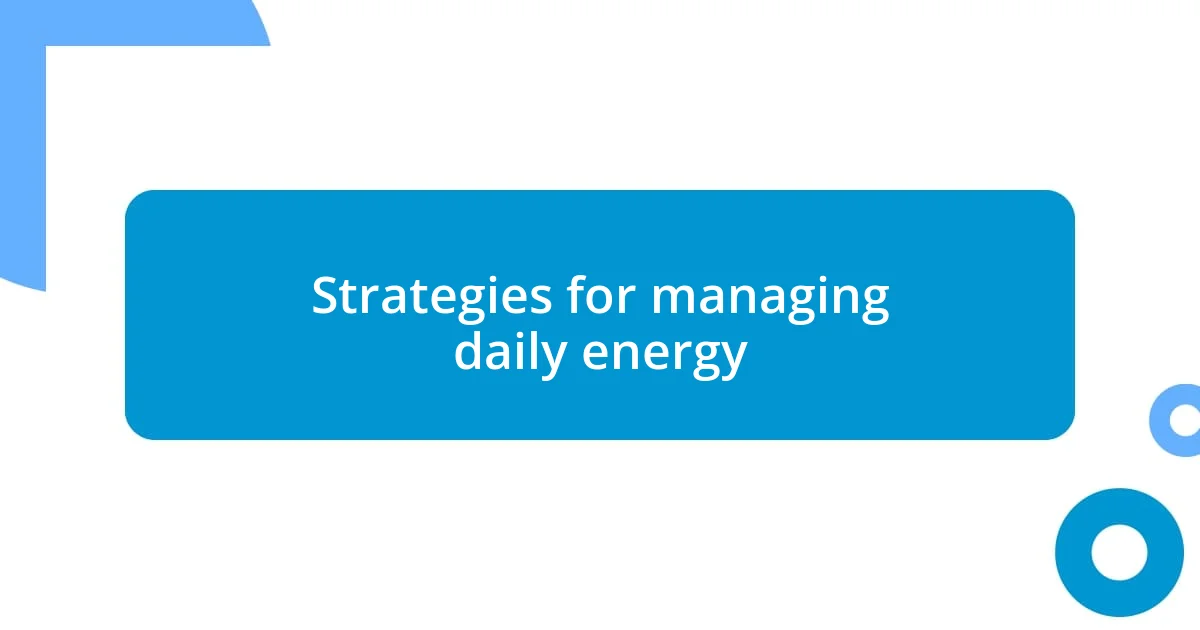
Strategies for managing daily energy
If there’s one thing I’ve learned about managing energy during pregnancy, it’s the importance of pacing myself. I started to break tasks into smaller, manageable chunks. For example, instead of planning a whole day of errands, I prioritized a couple of essential stops. This way, I saved my energy for what really mattered, and I didn’t feel overwhelmed. Do you find that overwhelming days can drain your spirit as well?
I also discovered that incorporating light exercise, like walking or gentle stretching, really helped to boost my energy levels. At first, I was skeptical; can gentle movements really make a difference? But to my surprise, regular movement actually energized me. It became a refreshing joy and oddly a form of self-care, transforming fatigue into a sense of accomplishment.
Lastly, I found mindfulness and relaxation techniques to be invaluable. Simple practices like deep breathing or even a short meditation can shift your energy focus drastically. I remember sitting quietly one afternoon, focusing on my breath, and feeling a wave of clarity wash over me. Have you tried these practices? They can be grounding when everything else feels chaotic.
| Strategy | Description |
|---|---|
| Task Pacing | Break tasks down into smaller chunks to avoid feeling overwhelmed. |
| Light Exercise | Incorporate gentle activities like walking or stretching to boost energy levels. |
| Mindfulness Techniques | Practice deep breathing or meditation to focus and recharge your energy. |
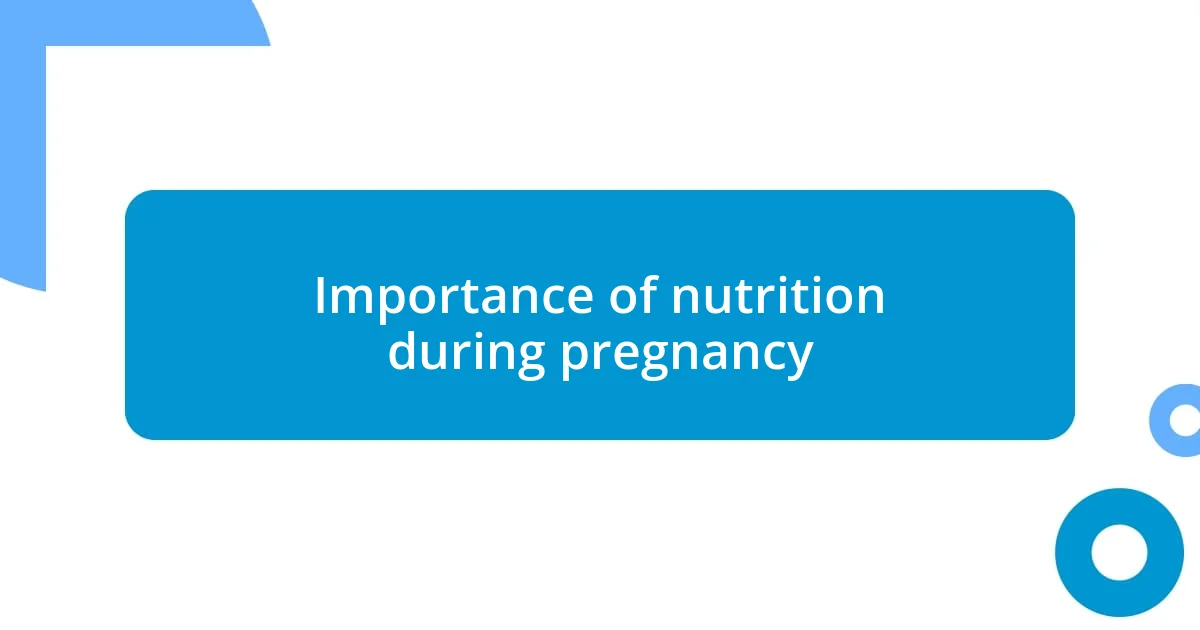
Importance of nutrition during pregnancy
Nutrition is a game-changer during pregnancy. I vividly recall my first trimester, when nausea plagued my mornings. I thought I couldn’t possibly eat anything nutritious. But forcing myself to incorporate small doses of protein and fresh fruits made a world of difference. For me, those nutrients were not just building blocks for the baby; they became a source of energy that helped combat my fatigue. Have you ever noticed how what you put into your body shapes how you feel?
During this transformative time, staying hydrated became another essential aspect of my nutrition. I made it a priority to sip water throughout the day, which surprisingly lifted some of the heavy fog of exhaustion I felt. I can’t stress enough how hydration supported my energy levels and overall well-being. How often do you check in with yourself about your water intake? It’s a simple habit that can significantly impact how energized you feel.
Lastly, focusing on whole foods was incredibly rewarding. I found that preparing home-cooked meals enriched with colorful vegetables not only nourished my body but also delighted my palate. It was a moment of pride when I sat down to enjoy something vibrant and wholesome. Have you ever experienced that satisfying feeling of eating something truly nourishing? It was a reminder that I was taking an active role in supporting both my health and my baby’s growth.
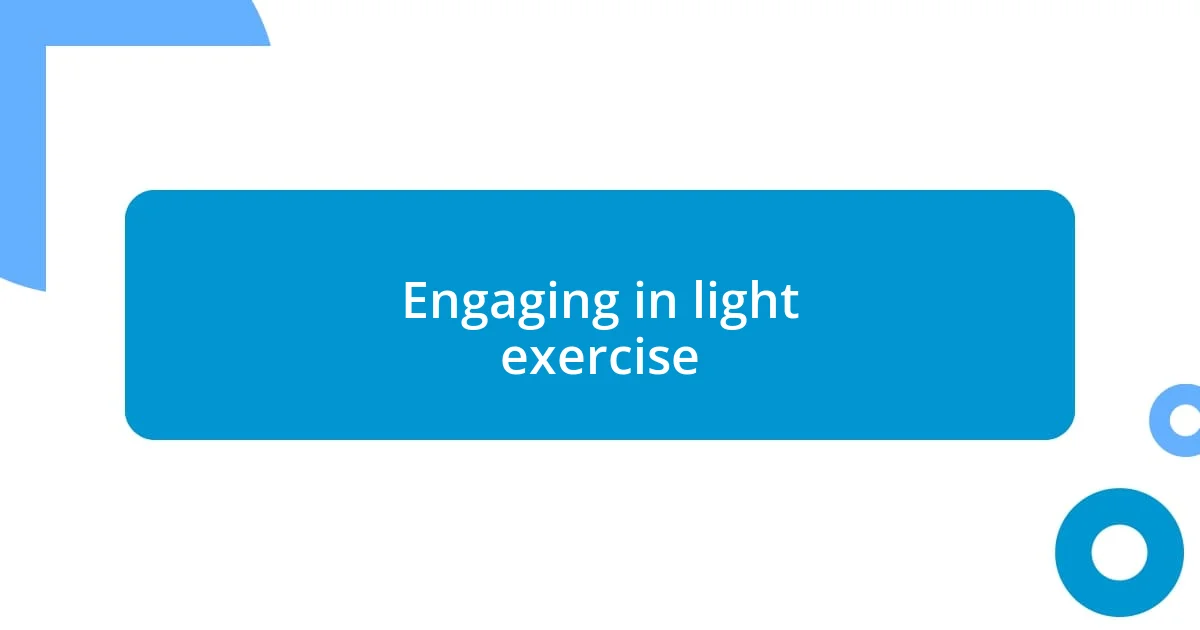
Engaging in light exercise
Incorporating light exercise into my routine felt like a subtle yet significant shift. I remember the first time I decided to take a walk around the neighborhood; it was just a slow stroll, but it was incredible how this gentle movement lifted my spirits. It’s fascinating how something so simple can stir joy, don’t you think? That little burst of energy made a world of difference in my day, transforming a cloudy mindset into a more positive one.
Gentle stretching became my go-to ritual as well. Each morning, I would find a quiet corner and start with some basic stretches, like reaching for the sky and gentle neck rolls. The relief that washed over me as I loosened those tight muscles was priceless. Occasionally, I would chuckle at my own inflexibility, but those laughter-filled moments created a bond between my body and me. Have you ever felt that release of tension, almost like a spiritual cleanse? I truly believe light exercise can foster that unique connection during pregnancy.
I also discovered that joining a low-impact prenatal yoga class was not just about exercise; it was a wonderful opportunity for connection. Engaging with other expectant mothers while moving gracefully on the mat helped me feel less isolated in my experiences. There’s something empowering about sharing this journey with others—has there ever been a moment in your life when camaraderie lifted your spirits? For me, it was a fantastic reminder that I wasn’t alone in navigating the challenges of pregnancy fatigue.
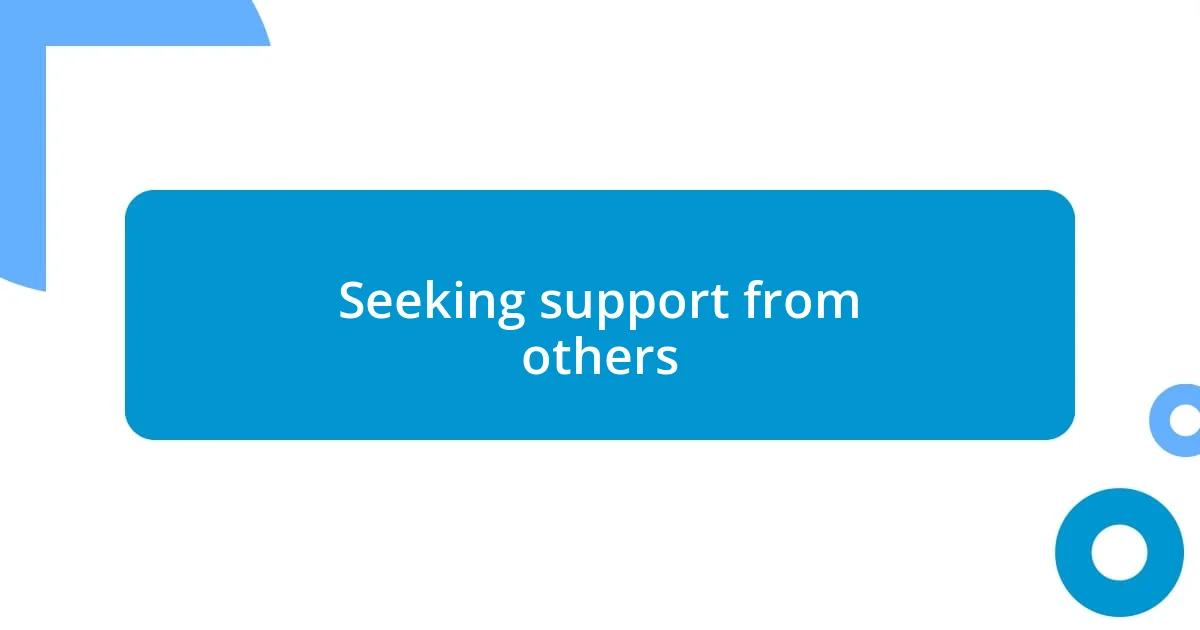
Seeking support from others
It took me a while to realize the importance of seeking support during my pregnancy. I remember feeling overwhelmed and exhausted, and it often felt like I was trudging through mud. Reaching out to friends and family for emotional backing was a game changer. Just sharing my feelings and concerns could lighten my mental load significantly. Have you ever felt the weight of a conversation lift your spirits?
One of my most cherished moments was when a close friend organized a little get-together with other pregnant moms. It was comforting to share our collective experiences, from discussing the things we craved to venting about our fatigue. Walking away from that evening, I felt invigorated—like I belonged to a community who understood the struggle. I often wonder how healing it is to connect with those who truly get what you’re going through.
Additionally, I learned to lean on my partner more during this time. It felt vulnerable asking for help with household chores, but it was a necessary step. I distinctly remember one evening when he surprised me by taking over dinner prep; I was utterly grateful and felt more like a team. In moments like those, I realized that sharing responsibilities created a supportive atmosphere that allowed me to recharge. Have you ever considered how asking for help can strengthen your relationships?














